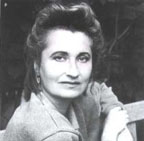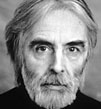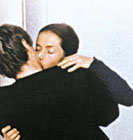|
She was called a "Nestbeschmutzer" (nest-fouler), a "sensationalist, communist, and "anti-American hack" and even "yet another freaked out feminazi Jewish woman, trying to spread her own not-so-unique brand of chaos".
Her name is Elfriede Jelinek, the recipient of the Nobel Prize for Literature in 2004 (the tenth woman by the way). In its official announcement of October 7, 2004 the committee cites the "musical flow of voices and counter-voices" in her work, that "with extraordinary linguistic zeal reveals the absurdity of society's clichés and their subjugating power." In its official announcement of October 7, 2004 the committee cites the "musical flow of voices and counter-voices" in her work, that "with extraordinary linguistic zeal reveals the absurdity of society's clichés and their subjugating power."
Jelinek was born in the alpine resort of Mürzzuschlag, but she grew up in Vienna. Jelinek's father, Friedrich Jelinek, a chemist, was of Czech-Jewish origin. He died in 1969 in a mental hospital. From 1960 Jelinek studied piano and organ at the famous Music Conservatory. After graduating from high school, she studied Theatre and History of Art. In 1967 Jelinek devoted herself entirely to writing. Her first book, Lisas Schatten (1967), was a collection of poems. Jelinek's early works were written under the influence of the so-called Vienna group, established by the writer H. C. Artmann. In 1974 Jelinek married Gottfried Hüngsberg, who worked in several films with German director Rainer Werner Fassbinder. Between the years 1974 and 1991 she was a member the Austrian Communist Party. Jelinek has been a fierce opponent of the ultra rightist Jörg Haider and his Freedom Party and forbade performances of her plays in Austria in protest after the party joined the government.
Many of Austria's leading writers, such as Peter Handke, Elfriede Jelinek and the late Thomas Bernhard, who have identified with the 'antifa' (anti-fascist) left, have found themselves harassed and vilified at home while feted abroad. Accepting Germany's prestigious Heinrich Böll prize in 1986, Jelinek recalled how police had dragged Handke from a telephone box in Salzburg, and how a government minister had suggested that Bernhard's brain be made a subject for medical science because 'we oppose so many of the beautiful things that are happening here in Austria.'
Who is this woman, unknown to many until she received the Nobel Prize for Literature and a highly controversial figure in her homeland?
Jelinek is a brilliant writer, but not an easy, pleasant one and feminism and political conscience cannot be divided in her writings.
She has written a large number of pieces for radio and the theatre, in which she successively abandoned traditional dialogues for a kind of polyphonic monologues that do not serve to delineate roles but to permit voices from various levels of the psyche and history to be heard simultaneously. What she puts on stage in plays from recent years – Totenauberg, Raststätte, Wolken. Heim, Ein Sportstück, In den Alpen, Das Werk and others – are less characters than "language interfaces" confronting each other. Jelinek's so-called "princess dramas" (Der Tod und das Mädchen I–V, 2003), are variations on one of the writer's basic themes, the inability of women to fully come to life in a world where they are painted over with stereotypical images.
Jelinek's dramas continue the "anti-theatre» tradition created by Bertolt Brecht, which rejects illusions to create distance between the audience and the actors. "Ich will kein Theater," (I don't want theatre) Jelinek once said. Totenauberg (1991), which premiered in Vienna, dealt with the legacy of the Nazi era through the famous relationship of Martin Heidegger, who joined the Nazi party in 1933, and Hannah Arendt, his student, who was of Jewish origin. In her most acclaimed play of the 1990s, Ein Sportstück (1998), Jelinek associated sports with mass movements, war, and death. Jelinek has also written an opera libretto for Olga Neuwirth's Lost Highway, based on David Lynch's script and film.
First published in 1983, 'Die Klavierspielerin' (The Piano Teacher) is the masterpiece of Elfriede Jelinek.  Now a feature film directed by Michael Haneke, The Piano Teacher won three major prizes at the Cannes 2001 Festival including best actor for Benoit Magimel and best actress for Isabelle Huppert. Now a feature film directed by Michael Haneke, The Piano Teacher won three major prizes at the Cannes 2001 Festival including best actor for Benoit Magimel and best actress for Isabelle Huppert.
Erika Kohut, a spinster in her mid-30s, has been selected by her domineering mother to be sacrificed on the altar of art. Carefully groomed and trained, she's unfortunately not gifted enough to become a concert pianist. Instead, she teaches piano at the Vienna Conservatory. She still lives at home, and in the eyes of the world is the dutiful daughter. But there's another, dark sexual side of Erika that she finds difficult to repress. She goes to a peep show, frequents the local park where Turks and Serbo-Croats pick up women and, just for kicks, slices herself with a razor. When one of her students, Walter Klemmer, falls in love with her,
 |
Erika demands sadomasochistic rituals before she'll agree to sleep with him.
 |
While the subject matter is deliberately perverse, Jelinek gets behind the cream-puff prettiness of Vienna; this novel is not for the weak of heart. Violence is a cleansing force, a point that brings back uncomfortable overtones of an Austria 50 years ago.
In an interview with Jelinek states about the "Piano Teacher»: What interests me in a story is its resonance - in this case the unravelling of one of the women who carry on their backs, who carry to term the high culture that Austria so idolizes. The unlived sexuality expressed in voyeurism: A woman who cannot partake in life or in desire. Even the right to watch is a masculine right: The woman is always the one who is watched, never the one who watches. In that respect, to express it psychoanalytically, we are dealing here with a phallic woman who appropriates the male right to watch, and who therefore pays for it with her life.
When it was published, certain critics in Austria qualified the novel as pornographic.
But to Elfriede Jelinek, the novel is the opposite of pornography. Pornography suggests desire everywhere and at every moment. The novel proves that this does not exist, that it is a construct meant to keep women willing, because they are usually pornographic objects anyway, while men look at them, and can almost penetrate their bodies with their gaze. Jelinek's arguments, that sexual relationships in class societies are power structures.
"I am used to being misunderstood. I am even blamed for what I attempt to analyse in my writing. As so often happens, the messenger is attacked, and not what she expresses. No one is interested in that…"
And:" …My writings are limited to depicting analytically, but also polemically (sarcastically), the horrors of reality. Redemption is the specialty of other authors, male and female. My writing, my method, is based on criticism, not utopianism."
She describes the relationship between man and woman as a Hegelian relationship between master and slave. As long as men are able to increase their sexual value through work, fame or wealth, while women are only powerful through their body, beauty and youth, nothing will change. A woman who becomes famous through her work reduces her erotic value. A woman is permitted to chat or babble, but in Jelinek's opinion, speaking in public with authority is still the greatest transgression.
"A woman's artistic output makes her monstrous to men if she does not know how to make herself small at the same time and present herself as a commodity. At best people are afraid of her."
Elfriede Jelinek's home on the Web is at:
http://ourworld.compuserve.com/homepages/elfriede/
|